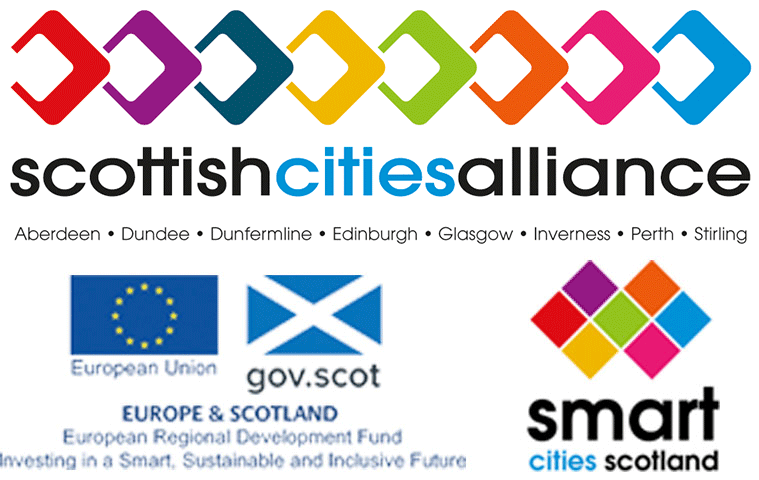Through the Scottish Cities Alliance, the seven Scottish cities have jointly developed a European Regional Development Fund (ERDF) Strategic Intervention entitled ‘Scotland’s 8th City, the Smart City’ (8th City Programme). A £10M ERDF commitment (with £14.1M of match funding from the cities) is supporting an ambitious programme of projects, which will enhance Smart City activity in Scotland by using Data and Digital Technologies to accelerate and transform the delivery of city services.
Glasgow City Council is developing five projects within this ERDF programme, including the Smart Communities (Mobile Working) project. This innovative mobile working project, seeks to rapidly deploy a series of new apps that will be fully integrated into the Council’s existing suite of business systems.
Through the Smart Communities project, Glasgow is committed to making better use of technology to create a flexible workforce that is better connected when working away from the office, by providing the information they need in the field, as well as minimising the associated administrative overheads. A smart, connected workforce is key to becoming a Smart City and mobile applications allow us to deliver a better service to the citizens of Glasgow while reducing costs.
However, developing new systems and apps is always a challenge – whether it’s issues around requirements, technologies, or methodologies – a whole web of complexity needs to be addressed before a fit-for-purpose solution can be successfully implemented. If, as in Glasgow’s case, you then add into the mix the provision of apps to be deployed to 2,500 frontline lone workers, then the issues and concerns heighten exponentially.
Glasgow has recently deployed iPhones and a suite of associated apps to 2,500 home carers, and over 100 Land & Environmental Services operatives across Glasgow. In the case of the home carers, the new apps will enable them to check in and check out of every visit they complete, thereby reducing the risk of missed visits. In the case of the environmental operatives, the apps will help with job scheduling for waste bulk uplift.
Both systems have been a big success and Glasgow is also currently deploying another app for transport workers, which will assist with scheduling and reduces paperwork dramatically.
The gold-dust of mobile apps deployment is the gathering of real-time data and, when dealing with frontline workers, a new mobile app is often the first time managers and strategists are able to see a rich picture of a previously ‘semi-visible’ workforce. Adopting an agile approach to delivery, and having the client at the centre of our thinking, has allowed us to develop these apps to be more functional leading to better service delivery to citizens and providing a better experience to our workforce.
In looking at how best to design and deliver our apps a key decision was made to involve frontline staff from the very start of our thinking. It was also decided that all members of the mobile working development team would be co-located in a single space. Bringing technical staff into the same space as system designers, business engagement specialists and management had a really positive benefit for the team. Shared objectives were understood and actively supported; communication was enhanced and wasted time was reduced as it was quicker and easier to resolve issues and to deal with competing objectives. We called this method the ‘App Factory’ approach.
In terms of involving frontline workers, from the outset we had business engagement sessions in depots and offices around the city – it was important that the development team visited workers on their own patch. This was followed by representatives getting involved in ‘user stories’ and systems design and then acting as implementation champions.
On day one of the bulk uplift app going live, technical staff joined cleansing operatives on an early morning shift, helping to lift rubbish from kerbside to truck; the credibility this brought from within the team was amazing. In home care services, app designers set-up in a home care base for a couple of months, enabling quick reactions to queries from home carers by jumping in a car and visiting the home carer as they went about their work. Again, credibility was gained as carers felt they were being listened to and issues were addressed quickly.
Returning to the idea that data gathered from frontline worker applications is gold dust, we have been working alongside Glasgow’s Corporate Data Team – another project funded by the 8th City ERDF programme, the Cities Investment Fund, and Glasgow City Council; this project is looking at corporate data and applying data science principles and we hope that this collaboration will return better service delivery and reduced costs due to improved scheduling and routing of work.
The final point I’d like to make in this blog is the importance of acceptance. Frontline workers have little tolerance for buggy apps, for apps that don’t meet their needs simply, or apps that slow them down. This group of workers are uniquely focussed on the job and the people they support – and, as service designers, we need to remember this. The best way to get comprehensive adoption is to ensure a real benefit for everyone that comes into contact with the app. So whether you’re a frontline worker; a supervisor, manager or strategist – there needs to be a win for you – something that has a unique benefit to make your work either easier or richer: if your app does this then you’ve cracked it!
Contact details:
Smart Communities / Mobile Working Project
Brendan Murphy
Head of Creative Services and Mobile Project Lead
Cordia (Services) LLP, Glasgow
0141 353 9020 / Brendan.murphy@glasgow.gov.uk
Scotland’s 8th City – the Smart City ERDF Strategic Intervention
Jonathan Brown
Programme Manager
8th City Programme Management office
0141 287 8663 / jonathan.brown@glasgow.gov.uk

 X
X Linkedin
Linkedin